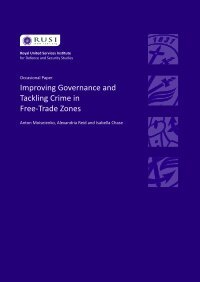Improving Governance and Tackling Crime in Free-Trade Zones
By Anton Moiseienko, Alexandria Reid and Isabella Chase
This paper identifies factors that render free-trade zones vulnerable to illicit trade and financial crime and proposes measures to detect and prevent it. Free-trade zones (FTZs) are designed to attract trade by suspending the collection of customs duties. These incentives are frequently coupled with advantages such as simplified customs inspection procedures, liberalised incorporation regimes and physical infrastructure superior to that available elsewhere in the same country. These features can be attractive to legitimate businesses and criminal groups alike. International organisations such as the OECD, the World Customs Organization, the Financial Action Task Force and the EU have all highlighted criminal risks related to FTZs. This paper identifies factors that render FTZs vulnerable to illicit trade and financial crime and proposes measures to detect and prevent it. To explore common challenges and responses that transcend countries’ individual circumstances, it examines four country case studies: Morocco, Panama, Singapore and the UAE. Based on 74 interviews, two research workshops and an analysis of publicly available literature, this paper identifies key challenges faced by the case study countries, which are also likely to apply to other countries that host FTZs:
London: Royal United Services Institute, 2020. 62p.


